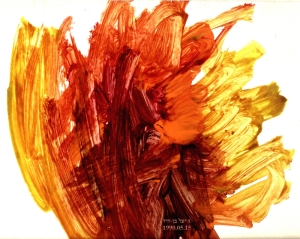òÂ÷ÅéãÈä
Updated: 2013.09.29
 |
A•qeid•âhꞋ; binding. (usually refers to òÂ÷ÅéãÇú éÄöÀçÇ÷ àÈáÄéðåÌ the binding of Yitz•khâqꞋ Âv•iꞋnu, bᵊ-Reish•itꞋ 22.1-19).
Tor•âhꞋ documents that in Av•râ•hâmꞋ's era, when everything seemed lost, the politically correct, last-ditch, desperate method believed to enable one to prevail on his god was to demonstrate his absolute sincerity and unreserved belief in, and dedication to, his god by sacrificing his firstborn son (Mᵊlâkh•imꞋ Beit 3.26-27; See also MikhꞋâh 6.7-8).
This episode records how Av•râ•hâmꞋ weaned himself, and his posterity, from this practice.
The whole, routinely missed, point of the A•qeid•âhꞋ is Av•râ•hâmꞋ's questioning the principle of sacrificing one's firstborn—while struggling with the question of how to properly demonstrate his complete sincerity and unreserved belief in the Singularity-Creator, é--ä. Av•râ•hâmꞋ's question, the whole point of the A•qeid•âhꞋ, was: is sacrificing one's firstborn consistent with unreserved belief in the Singularity-Creator? Was whoever was speaking to Av•râ•hâmꞋ in the name of "ha-Ël•oh•imꞋ" speaking the Will of é--ä?
The answer of the A•qeid•âhꞋ: No! And thereafter, Av•râ•hâmꞋ abandoned the goy•imꞋ practice. Never in Tor•âhꞋ, no matter how desperate, does any Judaic leader, except for the terrible error of Yi•phƏtâkhꞋ (Sho•phƏt•imꞋ 11.1–12.7), even remotely consider it.
Incidentally, this universal practice of the goy•imꞋ was the cause of the deaths of all of the firstborn in Egypt leading up to the Yᵊtzi•âhꞋ! Placing sheep blood on the door posts, instead of their sons' blood, is how the Israelis deceived Pharaoh's soldiers into assuming they had obeyed Pharaoh's orders.
The principle of proving one's absolute love and dedication through the sacrifice of one's firstborn son traces through Egypt, Moab and the ancient Middle East through Greco-Roman Hellenism to the 2nd-4th-century Hellenist Roman Christian doctrine of their god's love for them (John 3.16)! Thus, the A•qeid•âhꞋ poses yet another example exposing the intractable contradiction of Tor•âhꞋ intrinsic in Christianity.
Google+ registered author & publisher
Google+

